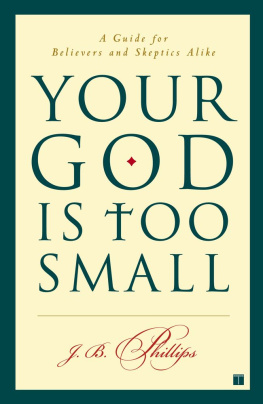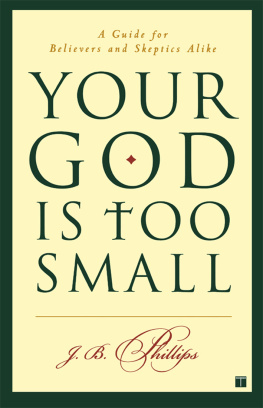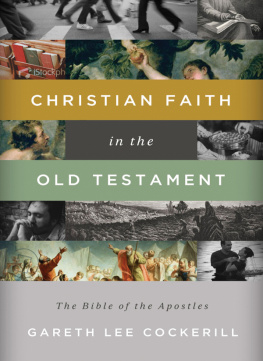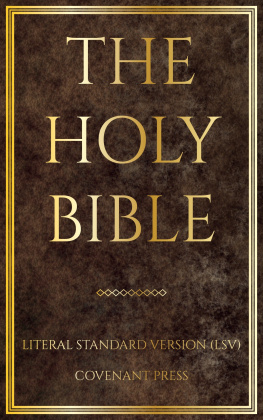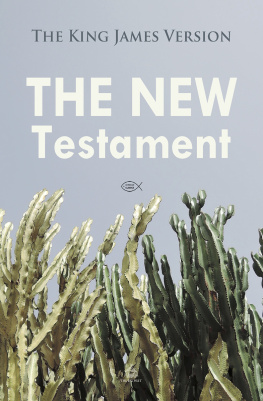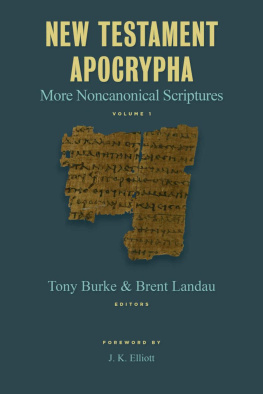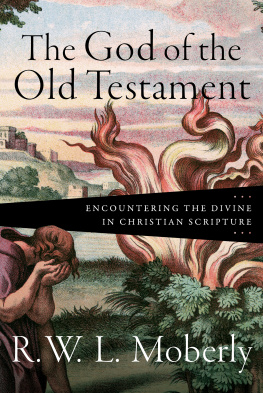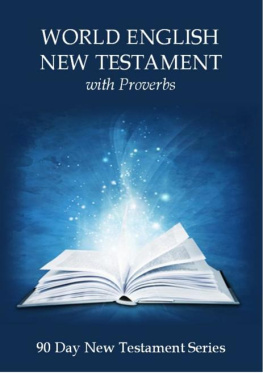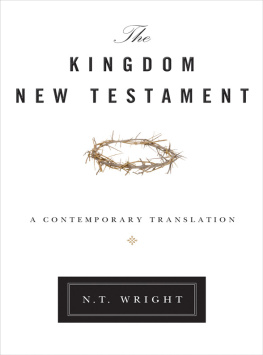Thank you for downloading this Simon & Schuster ebook.
Get a FREE ebook when you join our mailing list. Plus, get updates on new releases, deals, recommended reads, and more from Simon & Schuster. Click below to sign up and see terms and conditions.
CLICK HERE TO SIGN UP
Already a subscriber? Provide your email again so we can register this ebook and send you more of what you like to read. You will continue to receive exclusive offers in your inbox.
CONTENTS
MAPS
I DEDICATE THIS TRANSLATION TO VERA MY WIFE AND FINEST CRITIC
INTRODUCTION TO THIS NEW EDITION
I would like to make it clear to my readers that this new edition is in fact a new translation from the latest and best Greek text published by the United Bible Societies in 1966 and recognised by scholars of all denominations as the best source available. Naturally some considerable parts of the former translation reappear, but that is only because after considerable thought I did not think I could improve upon their wording. However, the reader may rest assured that every single Greek word was read and considered. This rather exacting task took me more than two years.
I fear that a little personal history must be part of the explanation of why I have now been able to start completely afresh. I began the work of translation as long ago as 1941, and the work was undertaken primarily for the benefit of my Youth Club, and members of my congregation, in a much-bombed parish in S.E. London. I had almost no tools to work with apart from my own Greek Testament and no friends who could help me in this particular field. I felt then that since much of the New Testament was written to Christians in danger, it should be particularly appropriate for us who, for many months, lived in a different, but no less real, danger. I began with the Epistles since most of my Christian members had at least a nodding acquaintance with the Gospels, but regarded the Epistles as obscure and difficult and therefore largely unread. In those days of danger and emergency I was not over-concerned with minute accuracy, I wanted above all to convey the vitality and radiant faith as well as the courage of the early Church. The attempt succeeded and, as I have mentioned in the Translators Preface to earlier editions, the strong encouragement of C. S. Lewis led me to continue the task. The war was over and I had been moved to a large and scattered country parish in Surrey before the translation of the Epistles was completed. I revised the typescript as well as I could with many other demands on my hands, and after many rejections succeeded in finding a publisher in the late Mr. Geoffrey Bles. The work, under the title Letters to Young Churches, appeared in 1947.
Within five years and not without trepidation I had completed The Gospels in Modern English, and this was similarly well received. I then began the Acts, which I renamed The Young Church in Action. But before I could complete this I realised that the work of translation plus the many duties of a large parish were proving too formidable a task for me. I therefore purchased a small house in a quiet part of Dorset where I could continue my translation and other writing, and attend properly to the huge volume of correspondence that was beginning to arrive from all over the English-speaking world. Thus it happened that The Young Church in Action and The Book of Revelation were both published after I had left parish work.
In 1958 the books were collected together in one volume and published under the title of The Neto Testament in Modern English. During the years from 1947 to 1958 I had been able to make some minor alterations and to correct some errors, many of which were pointed out to me by kind friends. The edition of my complete translation issued in 1960 incorporated a large number of small but significant emendations.
Now, more than ten years later, I offer this translation as a wholly new book. Having by this time done much collateral reading and learned more of the usages of the N.T. Greek, I felt that now, faced with a completely clean sheet, as it were, I could do a better job. Quite apart from my own feelings there were good reasons for tackling this rather daunting task. The most important by far was the fact, which perhaps I had been slow to grasp, that Phillips was being used as an authoritative version by Bible Study Groups in various parts of the world. I still feel that the most important object of the exercise is communication. I see it as my job as one who knows Greek pretty well and ordinary English very well to convey the living quality of the N.T. documents. I want above all to create in my readers the same emotions as the original writings evoked nearly 2,000 years ago. This passion of mine for communication, for I can hardly call it less, has led me sometimes into paraphrase and sometimes to interpolate clarifying remarks which are certainly not in the Greek. But being now regarded as an authority, I felt I must curb my youthful enthusiasms and keep as close as I possibly could to the Greek text. Thus most of my conversationally-worded additions in the Letters of Paul had to go. Carried away sometimes by the intensity of his argument or by his passion for the welfare of his new converts I found I had inserted things like, as I am sure you realise or you must know by now and many extra words which do not occur in the Greek text at all. I must say that it was not without some pangs of regret that I deleted nearly all of them!
There was a further reason for making the translation not merely readable but as accurate as I could make it. It has been proposed that a Commentary on the Phillips translation should be undertaken. I felt it essential that the scholars who would contribute to such work should have before them the best translation of which I am capable. I certainly did not want them to waste time in pointing out errors which I had in fact by now corrected!
The last, but not least important, reason for making a fresh translation was to check the English itself. It must be current and easily understood, and I must confess that I thought that the twenty-five years since the publication of Letters to Young Churches might have seriously dated the English I used then. With the help of my wife, several friends, including some critical young people, we scrutinised the English very carefully. Rather to my surprise only a few alterations were necessary, and this showed me that the ordinary English which we use in communication changes far more slowly than I had imagined. I knew, however, that slang and colloquialisms change rapidly, but since I had used few of these there was not much to alter. A couple of examples may illustrate my meaning. The little tin gods of I Peter 5, 3 (an expression no longer current) have become dictators. The colloquial use of the word plutocrats of James 5, 1 has been changed to men of affluence.
The essential principles of translation
There seem to be three necessary tests which any work of transference from one language to another must pass before it can be classed as good translation. The first is simply that it must not sound like a translation at all. If it is skilfully done, and we are not previously informed, we should be quite unaware that it is a translation, even though the work we are reading is far distant from us in both time and place. That is a first, and indeed fundamental test, but it is not by itself sufficient. For the translator himself may be a skilful writer, and although he may have conveyed the essential meaning, characterisation and plot of the original author, he may have so strong a style of his own that he completely changes that of the original author. The example of this kind of translation which springs most readily to my mind is Fitzgeralds Rubdiydt of Omar Khayym. I would therefore make this the second test: that a translator does his work with the least possible obtrusion of his own personality. The third and final test which a good translator should be able to pass is that of being able to produce in the hearts and minds of his readers an effect equivalent to that produced by the author upon his original readers. Of course no translator living would claim that his work successfully achieved these three ideals. But he must bear them in mind constantly as principles for his guidance.
Next page
